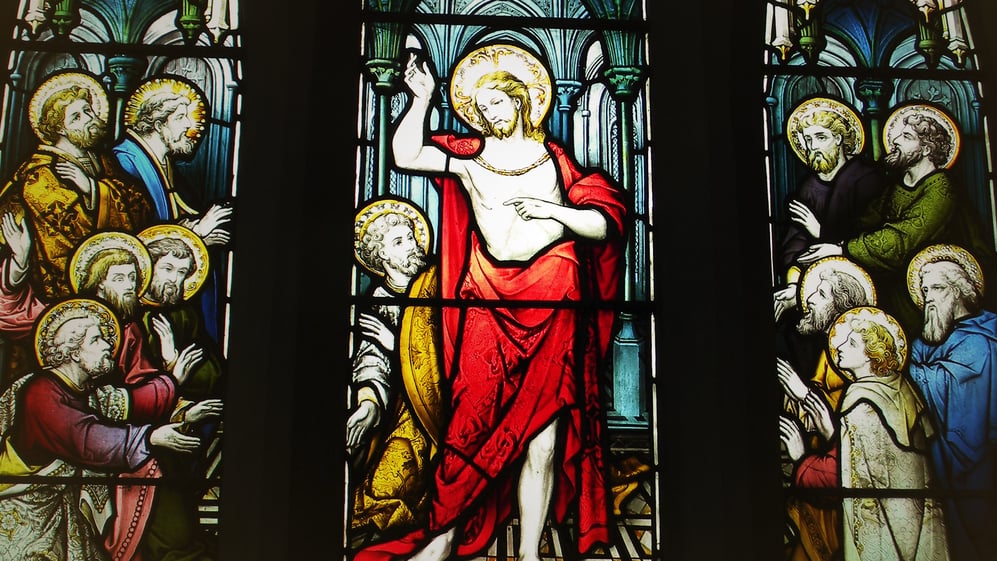Our culture often promotes relaxed and casual attitudes toward church, urging that a church should be a place where you feel welcomed and comfortable and where you can enjoy your favorite songs while sipping your favorite latte. As appealing as this sounds, why should we strive to keep church and worship reverent? What does music have to do with it?
Church as something set apart
As I urge appropriate behavior among my students, the word that comes up over and over again is “reverent.” My students know what it means to sing something “reverently” versus using a silly voice or singing in a casual way. They also know what it means to show reverence physically as we practice standing, sitting, kneeling, and walking reverently, in addition to striving for reverent countenances.
All of these behaviors used specifically for church or chapel or for singing hymns and psalms serve to set these places and activities apart. Their proper behavior along with their specific chapel uniform and the liturgy indicates that the house of God is a unique place that is not like the playground or their homes or even their classrooms. All of these things show that divine matters are of the utmost importance and demand our serious contemplation, study, and adoration.
Countercultural
Our culture endorses the feelings of safety, comfort, and convenience. While perhaps begun with the best of intentions, these attitudes tend to permeate everything we do, including worship. Suddenly, dressing up for church becomes “trying too hard,” chanting psalms a cappella as a congregation is “too difficult,” and the liturgy seems “too stuffy and forced.” Many churches sneakily eliminate reverence by taking out parts of the liturgy to shorten the service because it takes up way too much of our Sunday morning. Or they might utilize bland songs in order to dupe their congregants into “feeling” their faith. Chapels devolve into little more than childish entertainment, perhaps (or perhaps not) culminating in saccharine messages offhandedly mentioning that Jesus loves you and not much more.
Retaining reverence is countercultural. Church-going itself, the very act of waking early on a Sunday morning and putting effort into your appearance out of respect instead of vanity, goes against our current culture, but reverence goes above and beyond even that. When we are reverent, we have to admit that our comfort and our convenience do not supersede spending two hours at church on a weekend. We have to acknowledge that dressing nicely is necessary not to draw attention to our own appearance, but to honor the place to which we go. Being reverent means learning and loving the established choreography of both pastors and congregants, the standing, sitting, kneeling, bowing, all in sync, deliberately, and with humility. It means that we cannot be apathetic or halfhearted but must admit that we love church, we love hearing God’s Word, we love Christ totally because He is true and good and not because church is a place that makes us feel comfortable or because that one church right down the road has an 11 o’clock service, which means we don’t have to get up quite so early and yet can still check “pious, church-going Christian” off our list.
Reverent music
Reverence also includes the type of music we hear. The music I hear at church I hear nowhere else (except for maybe the concert hall, which, in fact, also is treated with decorum). Even the style of sacred music is totally unique. This ensures that when I hear that music, I know where I am. I am not enjoying a novel in my neighborhood coffee shop, I’m not grocery shopping, I’m not having a karaoke night, I’m not jamming out while driving down a country highway in the summer. When I hear sacred music, my attitude changes. It puts certain thoughts in my mind, thoughts of holiness and solemnity. If I were to hear even the style of my favorite pop songs in church, my attitude would be one of a carefree twenty-something on summer break. It would certainly not be one of contemplating God’s love for us in all its mystery, greatness, and beauty.
To be sure, music itself does not grant salvation. It does not inspire faith or automatically convert those who hear it. It does, however, give us a sense of the importance of the worship service. It evokes the proper emotions in our hearts, providing a sense of what we should be thinking and feeling. We also know that the text of hymns and other songs is often a prayer or a meditation upon the Word of God. When we use serious or solemnly joyful music in church, we show that our faith, our worship, God’s Word, and the Sacraments are not simply fun little traditions, but are the center of our thoughts and lives and hold eternal significance.
Living our lives reverently
The centrality of worship and the Gospel in our lives should be taken very seriously and reflect how we do what we do. During our recent wedding preparations, my husband and I were united in wanting a very solemn church ceremony. Although we carefully trod the line of a reverent yet non-alienating for non-Lutherans service, our ceremony was liturgical and solemnly joyful. We sang hymns, had a psalm chanted, and heard a robust, Christ-centered sermon. Our wedding ceremony was not the norm, though, even for Christians. We recognized that marriage is serious and that Christ is the center. While outdoor locations are often beautiful and canned pop songs about love seem appealing, a reverently-conducted church ceremony lent the event proper weight and gravity.
This aspect of reverence, then, can be applied to all areas of our life. Although it is easy to try to play it cool and not want to make a big deal out of things, we should recognize that many things in life are very serious and deserve our utmost respect. When we treat church and worship with the reverence that is due, we show that our faith is something to be taken seriously. We remind ourselves that we should rightly treat this place with respect. Church is not to be taken lightly and casually but should be a place we love and honor. It is, after all, the house of God.
“O LORD, I love the habitation of Your house
and the place where Your glory dwells.” (Psalm 26:8, ESV)
For people who want to dig deeper into the role of music in worship, read The Gospel Preached through Music.













